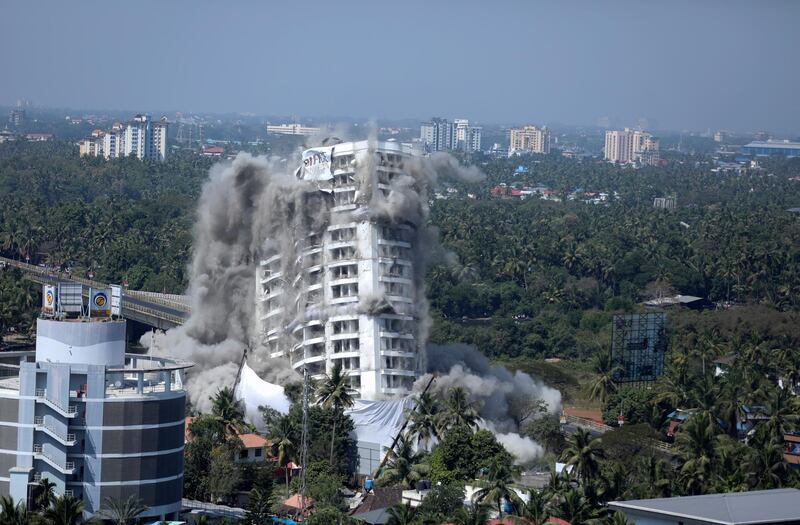Four luxury waterfront high-rises in southern India will be reduced to rubble in controlled explosions this weekend in a rare example of authorities getting tough on builders who break environmental rules.
India has seen a construction boom in recent years but developers have often ridden roughshod over safety and other regulations, and with the connivance of local officials.
The inhabitants of the four apartment blocks in Kochi bought their 343 flats in good faith and now face a lengthy legal fight to recoup their money. Some had invested their life savings.
First to be blown up on Saturday morning will be the 19-floor H2O Holy Faith complex of 90 flats — now empty — overlooking Kerala state's famous lush backwaters.
Five minutes later, the twin towers of Alfa Serene will tumble.
On Sunday, high explosives drilled into the walls will bring down the two remaining complexes.
Sirens will sound and people have been told to stay at least 200 metres (220 yards) away while ambulances and fire engines will be kept on standby.
Police commissioner Vijay Sakhare said they were ready to manage crowds they expected would flock for a "once-in-a-lifetime kind of spectacle".
Nearby residents said they were worried about the impact of the demolition on their homes, however.
"One of the companies tasked with demolition has no expertise. They deal in steel and scrap. We are really worried," Divya, who has moved into temporary accommodation, said.
"When they were demolishing the swimming pool, some of the houses in our neighbourhood developed cracks."
The demolition caps a saga that began in 2006 when a local governing body granted permission to private builders to erect the high-rises.
But last year, the Supreme Court ruled that the builders were in breach of rules about construction in an ecologically-sensitive coastal zone, calling it a "colossal loss".
"It's a high-tide area and hundreds of illegal structures have come up in the coastal zone," the court ruled as it ordered the buildings razed.
Kerala is famed for its backwaters, brackish lagoons and lakes that run parallel to the Arabian Sea — creating an environmentally-fragile region.
In 2018, the state was battered by its worst floods in almost a century that killed more than 400 people.
Experts blamed the disaster on the government's eagerness to build houses, hotels and resorts with little regard for coastal planning regulations.
The residents of the Maradu apartments initially refused to vacate but moved out after local authorities cut water and power supplies.
They have been given interim partial compensation by the state government while the builders are in the process of providing a refund.
"My wife and children are so sad, they can't see their beloved home go down like this," sighed Shamshudeen Karunagapally, who bought a flat for $145,000.
"I know that in many of the other families children are suffering from depression … We don't know when we will get the full compensation."







